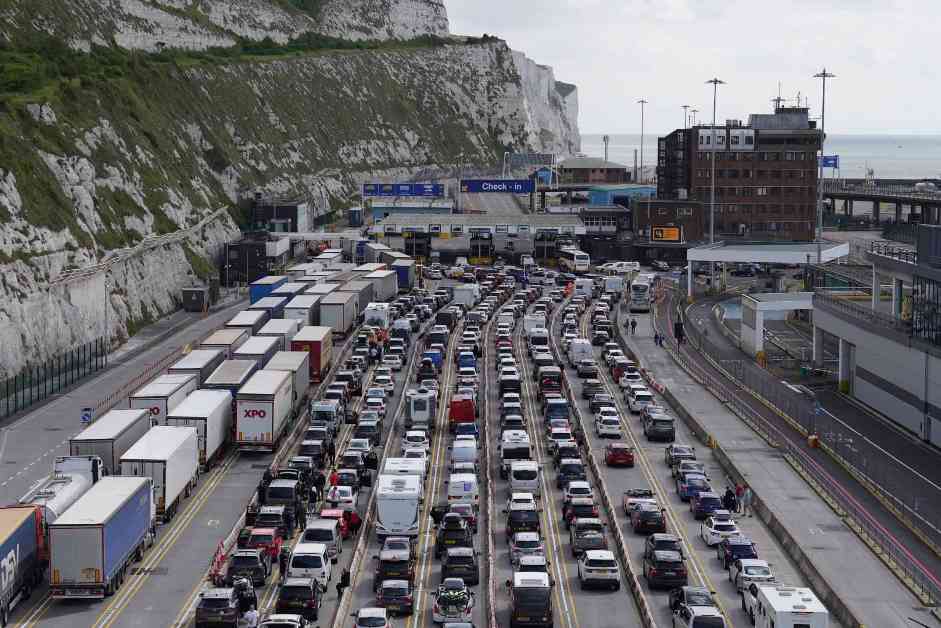The Port of Dover: Navigating the Impact of Post-Brexit Travel Laws
As the dust settles on the UK’s departure from the European Union, the ramifications of Brexit continue to reverberate throughout the country. One area that is feeling the effects acutely is the Port of Dover, a crucial gateway for travelers crossing the English Channel to mainland Europe. With the EU now implementing stricter border laws post-Brexit, travelers from the UK can expect significant delays and heightened scrutiny when attempting to make the journey to France.
A Shift Towards Cold War-Era Travel Restrictions
Renowned travel expert Simon Calder recently highlighted in The Independent that some of the new regulations being enforced echo practices from the Cold War era. Starting in November, British citizens traveling from Dover to France will face more stringent processing procedures. French border officials will now be required to collect biometric data, including fingerprints and facial scans, from individuals entering the EU nation.
For those traveling by car, a common mode of transportation for holidaymakers, the process at the border will become more intense. Non-commercial passenger vehicles will be directed to a designated area under a large canopy, where they will undergo thorough scrutiny by border guards. This shift in procedure is expected to lead to longer wait times and increased congestion at the port.
Coaches and buses, on the other hand, will be subject to a different set of regulations under the EU’s Entry and Exit System (EES). Coaches will be directed to the western side of the docks and sealed by security officials once processing is complete. This method, reminiscent of practices in West Germany during the Cold War, will see passengers effectively entering French territory while still in transit through Dover.
Challenges Ahead for the Port of Dover
Doug Bannister, CEO of the Port of Dover, has raised concerns about the port’s ability to handle the influx of summer traffic following Easter next year, given the additional border checks in place. The implementation of these new procedures has raised the ire of social media users, who are grappling with the increased bureaucracy and delays associated with post-Brexit travel.
Vote Leave, the campaign that advocated for heightened border security as part of Brexit, has inadvertently exposed British travelers to the realities of EU border management. Author Edwin Hayward, a vocal critic of Brexit, has likened the new border controls to an “iron curtain,” symbolizing the barriers and restrictions that now define travel between the UK and the EU.
Looking Ahead: Navigating a New Normal in Travel
As travelers adjust to the new reality of post-Brexit travel, it is essential to consider the long-term implications of these changes. The Port of Dover, once a bustling hub of cross-Channel journeys, now faces the challenge of accommodating increased security measures while ensuring the smooth flow of traffic.
The Impact on Tourism and Trade
The stringent border checks and delays at the Port of Dover have broader implications for the tourism and trade industries. With travelers facing extended wait times and heightened scrutiny, the appeal of cross-Channel trips may diminish, impacting the tourism sector in both the UK and France. Additionally, businesses reliant on seamless trade between the two nations may encounter disruptions and delays in their supply chains, leading to economic ramifications.
Challenges for Travelers
For British travelers accustomed to the ease of movement within the EU, the new border procedures present significant challenges. Longer wait times, increased documentation requirements, and the uncertainty of potential delays have created a sense of unease among those planning trips to Europe. Navigating the complexities of post-Brexit travel regulations requires careful planning and a willingness to adapt to a new set of norms.
The Role of Technology in Border Management
In response to the evolving landscape of cross-border travel, technology has emerged as a crucial tool in enhancing border management and security. Biometric systems, such as facial recognition and fingerprint scanning, play a pivotal role in verifying travelers’ identities and ensuring compliance with immigration protocols. By leveraging technological advancements, border authorities can streamline the processing of individuals and vehicles, leading to more efficient and secure border crossings.
As the Port of Dover grapples with the impact of post-Brexit travel laws, stakeholders across the travel and transportation industries must collaborate to address the challenges posed by the new regulations. By embracing innovation, fostering cooperation, and prioritizing the needs of travelers, the port can navigate this period of transition and emerge as a resilient and efficient gateway to Europe.





















